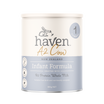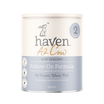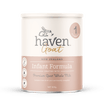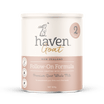When a baby is born, they are exposed to billions of microbes that take up residence in the mucosal lining of the gut. The types of microbes are dependent on several factors, including how the baby was born and how the baby is nourished following birth.
We know some aspects of breast milk can’t be mimicked by science due to the simple fact that breast milk is bespoke, and a mother’s milk changes based on the baby’s needs; for example, if the baby is unwell the mother will produce milk with more illness-specific antibodies.
For whatever reason you might be formula feeding, we are pro-choice and support your journey, and encourage you to research the ingredients in whichever formula you choose.
There is something special in Haven baby formula. If you turn your can of Haven around and glance your eye over the ingredients, you’ll see two abbreviations: FOS and GOS. As a clinical nutritionist, seeing these makes me happy.
Infants that consume prebiotic galacto-oligosaccharides (GOS) and fructo-oligosaccharides (FOS) (yes, I’m glad they abbreviated them too!) are seen to have significantly higher beneficial bacteria in their digestive tract. FOS and GOS prebiotics are a standout ingredient in Haven formula alongside many vitamins and minerals.
Why is gut health so important?
Gut health is important for a number of reasons; firstly, because it’s where all of our food is digested and turned into fuel for the body.
Probiotics are popular in the health industry but prebiotics are equally as important. Prebiotics are fuel/food for the beneficial bacteria. They are a type of non-digestible carbohydrate (otherwise known as resistant starch). Foods that contain resistant starch include green bananas, oats, barley, cooked and cooled rice and potato (think potato salad or overnight oats—or in this case, FOS and GOS in Haven baby formula).
Why do we want to feed these bacteria?
Stimulation of the entire intestinal flora with the use of prebiotics is seen to have a significant impact on our overall health. Our gut health influences our immune response and the reduction of hay fever, asthma and eczema—an interconnected trio known as atopic diseases.
The gut bacteria also have a significant relationship with the brain; researchers often refer to the gut as the second brain as more serotonin is produced in the gut than anywhere else in the body. The impact of gut health can influence sleep, mental health and behavioural issues.
Food intolerances could be very strongly linked to your gut health—a food intolerance is when the body struggles or is unable to properly digest a certain food item. This can create a build-up in the gut of gas, bloating, constipation, diarrhoea and many other symptoms. The inability to breakdown certain foods effectively can heavily impact the delicate balance of good bacteria.
Supporting your little one’s gut through the use of prebiotics may have a flow-on effect to all areas of their health. FOS and GOS prebiotics can help to increase bowel motion frequency and hence, it can help to prevent constipation in infants and children.














